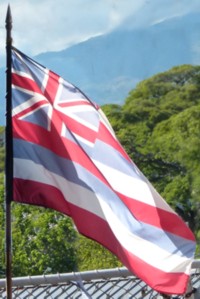When we talked of going to Hawaii for a couple of weeks in February 2018 several of our friends enthusiastically recommended it. To many of them it's a nice place to go on holidays - a little further to go than Bali but with a nicer climate, better beaches and better shopping - with bargains to be had at the designer outlets.
Waikiki
To nearly one and a half million racially diverse Hawaiians it's home.
Downtown Hilo
To other Americans it's the newest State, the only one thousands of miles from the North American Continent, and the one that's more exotic than Florida.
To some it's historically significant - the site of America's single greatest military defeat, unless you count Vietnam or perhaps Afghanistan - and it all took place on a single day: "a date which will live in infamy".
Here, on my father's 25th birthday, the course of world events took a dramatic new direction. He was not yet married to my mother. So to me it's one of those places where history most clearly influenced the conditions necessary for my birth and thus the birth of my children too.
But why was the United States Pacific Fleet at Pearl Harbour on December 7 1941? And why is that fleet no longer there?
That story goes back to the arrival of Captain James Cook at Kealakakua Bay, on the west coast of the island of Hawaii, on January 16 1779, and the outcomes that momentous event triggered for inhabitants of the newly discovered Sandwich Islands as more and more strangers arrived.
I found myself fascinated by the youngest US State's short but turbulent history. Statehood is one of the more recent events that I remember clearly. But you might like to skip these sections if these and other improbable events leading to your birth are of no interest.

